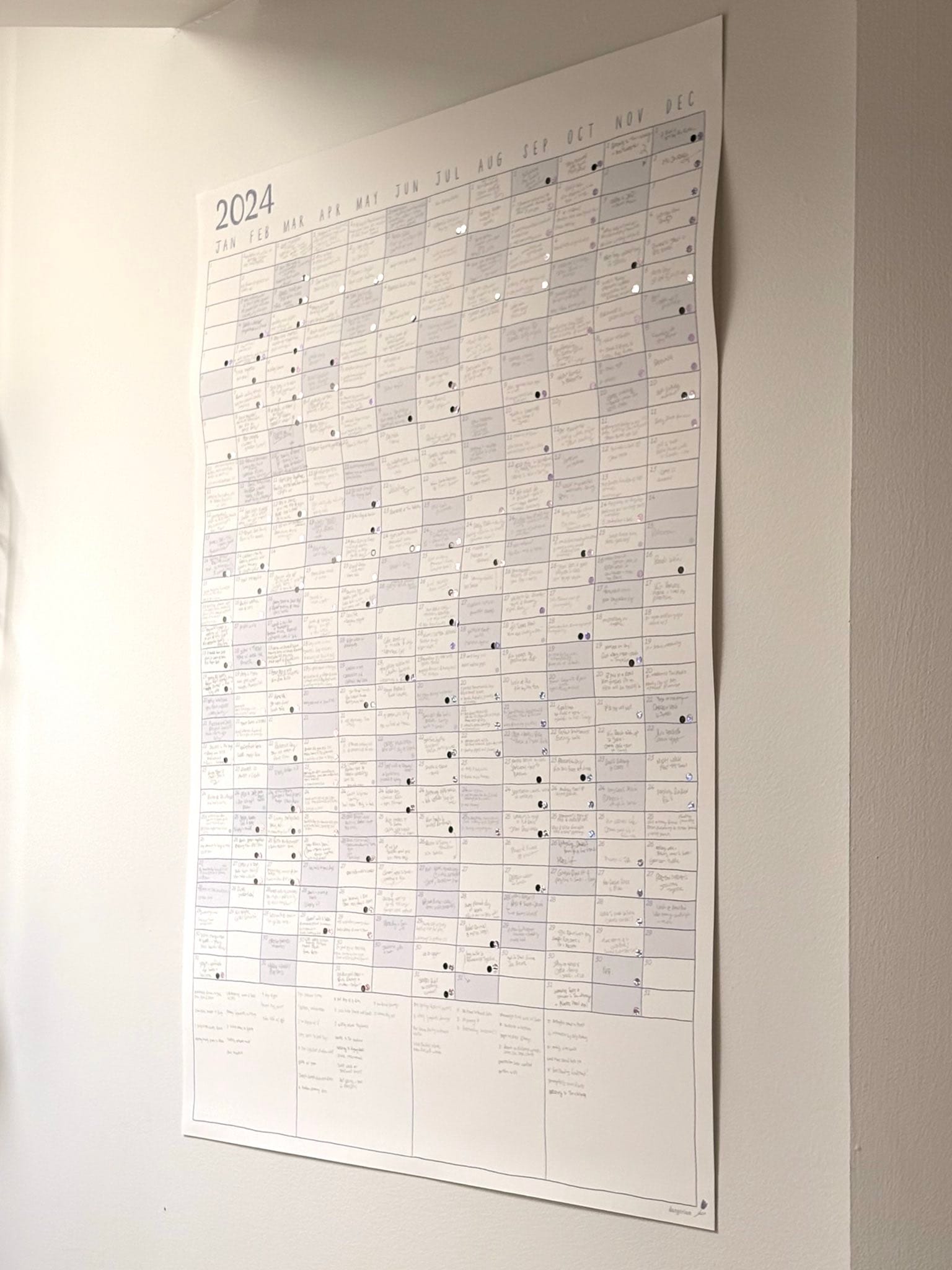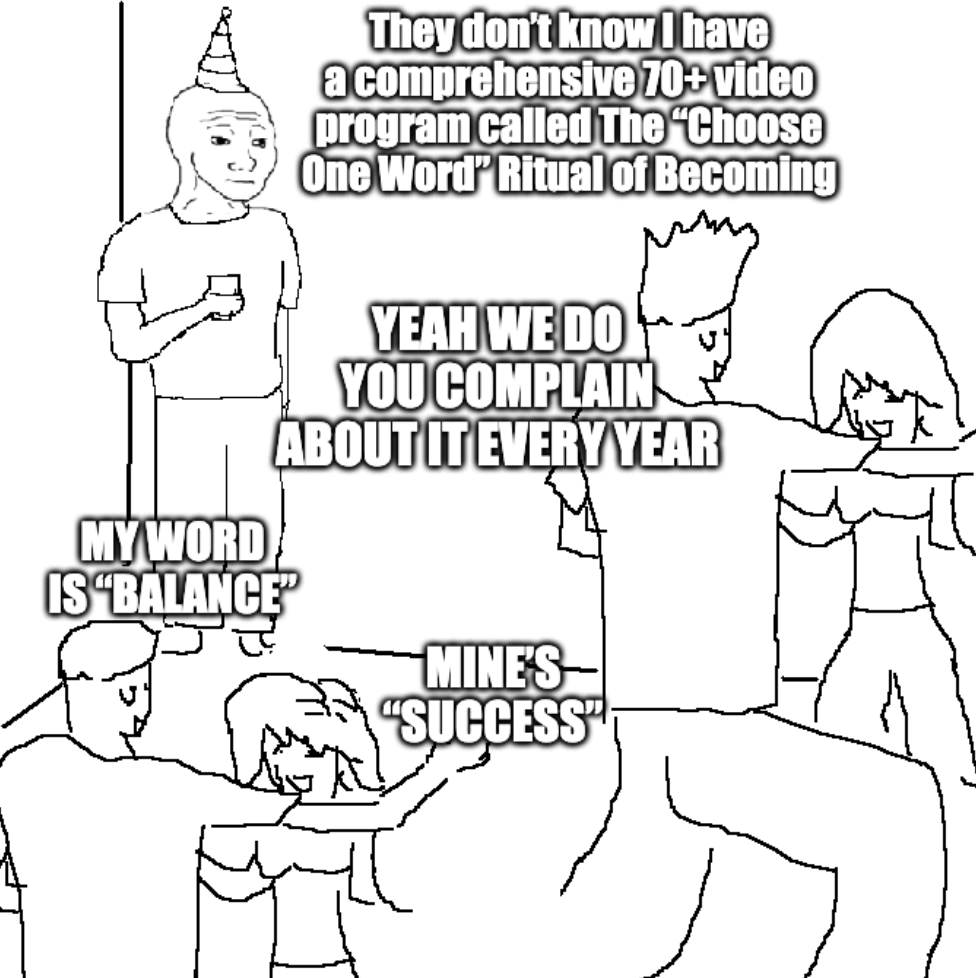🦊 Choose Your Wyrd
Hello! It’s that time of year where all sorts of ‘reflective’ activities are foisted upon us. Once upon a time, I didn’t quite mind, but these days I find that I am quite the snob when it comes to the art of ‘reflection’. I wish it were merely an amused indifference—but some of the booklets, videos and prompts I have seen on the topic of “end-of-year reflections” have caused this wizard to verily harrumph with fake affront.
I’m surely not alone in this. 😅
And so, for my own palliation at least, allow me to share a two unpopular yet qualified opinions on the art of reflecting.
But first—some quick updates:
A Shaman and a Wizard Talk Magic
I’ve recorded a new podcast episode: A Shaman and a Wizard Talk Magic. This is not one for the unimaginative, but if you have a penchant for the more-than-rational, I think you’ll find it good company.

This episode is a recording of a conversation I had with my new friend Simon van der Els—a molecular biology PhD turned inner development guide and shamanic healing practitioner, whom I met via mutual resonance on LinkedIn. Much of this conversation occurs outside of the Overton Window. You’ll kinda need to step through the window, follow the path through the meadow, and head down to the river. Once there, you’ll find us.
Reflecting on Reflection
And now I shall opine. Take this all with a pinch of salt—this is just me being a bit particular about the way we approach reflection. Two points, really:
1. Your End-of-Year Reflections Need Not Happen at the End of the Year
Though, admittedly, it is a good time for many of us.
The end-of-year brings some families and friends together, where someone remembers that thing you said you wanted to do last year, and they ask you about it. “How’s the book writing going, Jason?” for example. Many have some time off from work. And some have received new paper journals—or have invested in acquiring the fantastic wall-planner crafted by the dangerlam.
Before planning the new calendar year, it makes sense to reflect upon the year that was. Kim and I do this with one of the dangerlam wall-calendars we have in our bedroom. With this one we track highlights/gratitudes each day (and we give dots for days in which we did moderate or intense physical activity). Here’s a view from our bed as I pen this museletter to you.

Sometime soon we will go through the calendar, reliving our gratitudes and highlights while looking for patterns to imbibe into the year ahead. Last year we were reminded that we love going for walks in the rain. This year, I suspect, we will be reminded that we love our time by the river.
And/but! This is never forced. Sometimes we hold off on doing this until the end of January. And I know that many of us are still very busy at this time of year with work or other obligations. It’s also an incredibly social time of year. Deep reflection, at least to my sensibilities, is best suited to deep winter or the equinox. Midsummer is a time of revelry and lightness.
My advice: find the time that works for you. You’ll know the quiescent mood when it comes upon you.
I used to promote The Ritual of Becoming as an end-of-year thing, but then found the time too crowded. I now personally undertake the ritual each April, beginning with Fool’s day.
If you’re exhausted from the year—and, if you’re paying attention to what’s been happening in the world, it has been a hellish one—ease up. Rest. There’ll be time for reflection later. Relax, read, play. Restore yourself, so that when it comes to integrating what wisdom you glean from your reflections, you’ll be in a much more resourced space.
2. Relish (rather than Rank)
So many reflection activities, books and guides ask you to rate or rank the ‘top three’ experiences, lessons, relationships or learnings from your past year. Or to determine what your ‘best’ and ‘worst’ experiences were. And I’m sure many folks believe this works for them.
But the judgemental frame that ranks or rates experiences is mostly useful in context where expedient decision making is required. Such an approach misses the more subtle, poetic and developmental profundity that comes from experiences that are unpleasant or suboptimal.
But if we slow down, we can learn to relish each experience; savouring them whilst appreciating what lessons they harbour.
Some experiences from the past year will shine more salient than others, of course. But that doesn’t necessarily mean they are ‘better’ or ‘worse’.
Much of the first half of the year saw me ensnared by social media, watching an apartheid state commit genocide with impunity. I thought I was well-girded for the metacrisis—but I never had imagined its sympotms would look this bad. How would I rank the experience of seeing children be killed, starved and maimed? Worst experience! Would not recommend. Even worse to see the warlocks of Empire justify and defend it.
Yet I also know that this whole thing has transmuted into a kind of developmental quickening for me. I’m far more embodied and emotionally sensitive and attuned than I have been in decades. I feel the feels, more than ever before. I’m also even more discerning with media, now. I’m still not sure if this is a ‘good’ thing, but it feels like some kind of depth has been unlocked.
What experiences can you now—with some distance from them—appreciate for the developmental qualities, depth and insight they have bestowed? What experiences did you learn from this year?
Reflecting on The Ritual of Becoming
One of the more amusingly vexing experiences I’ve had over the past decade is observing people ‘pick a word’ for their year ahead after what seems to be a mere moment’s consideration. It’s amusing, perhaps, because I was once that person. Yet it’s also vexing because—at least from my limited (or arrogant) perspective—so many come tantalisingly close to genuine development, only to retreat into familiar, plateaued patterns.
Recently, I have been reflecting upon The “Choose One Word” Ritual of Becoming itself. It feels ripe for an overhaul. Two issues stand out to me:
- Emphasising The Word over The Ritual itself. Bypassing The Ritual—of deep reflection, introspection and projection—will result in mere incremental perpetuations of one’s current trajectory. The busy, overworked executive who is perpetually burning out will choose words like “accelerate” or “grit” or “deliberate”—when what they may need is something far more mysterious to break the pattern and embeckon new insight, depth and growth.
- Making it too easy to access for free. I tend to want to give away all value for free. Originally, I offered free access to folks who would ask me (via email). But then I just hid the free (100% off) discount code in plain sight on the sales page. When looking at the statistics for folks who have undertaken the lessons, those who paid (or manually requested free access) have engaged more than 15x more than those who simply accessed it the easy/free way. I’ve come to realise that making it all too easy is a disservice.

I accept that I may well be an esoteric wizard-snob in matters of conjuring a Word. One Word to serve as a fuzzy contextual beacon. And again, some people are quite happy with their lowercase ‘w’ words.
But the true magic, as far as I have come to learn, is in the embracing of the Wyrd.
Choose your Wyrd
The concept of Wyrd intertwines agency (your ‘free-ish’ will) with fate (the broader forces shaping outcomes), creating a dynamic interplay or ‘generative paradox’, if you will. We are not simply subject to the whims of Fate, nor are we the sole determinators—but something in-betwixt.
I also love that Wyrd is, in a general sense, used to describe something as either weird, uncanny or unfamiliar.
In my experience coaching and working with folk who intentionally lean into their developmental unfurling, it’s the weird Words—the Wyrd Words—that have been most potent. The pattern-disrupts. The ones that elicit curiosity and surprise.
Remember, much development comes from the synthesis of entropy and support. Too much entropy—without the opportunity to reflect and integrate—will be fraying and chaotic. But likewise, too much support—without the opportunity to experience and learn new things—will be stifling and mediocre. A predictable pattern that leads only to ossification and obstinance.
We need to cultivate a dynamical relationship to our participation in life, and the developmental unfurling that is only possible when we seek out That Which Bewilders.
Bewilderment is also an apt antidote to the algorithmic domestication the past decade or so has groomed us into. Difficulty awakens the genius, as Nassim Taleb writes. We come alive whenever we are challenged and bewildered.
So: be wilder.
My advice? If your reflective process feels too mechanical, tick-box and linear—if it all ‘clicks’ into place and reinforces a neat narrative arc—you may be missing the hidden lessons along the way. And if your Word doesn’t surprise, delight or baffle those around you—if its too normal, known and familiar to you—you may not be embracing the deeper transmuting magics available to you.
And that’s okay! Sometimes we need a chapter that is quiet and affirming. There is no rush. Do as thou wilt, etcetera.
But if you sense that there is more that beckons to you—if you sense a whole new chapter of life awaits thee—the self-paced Ritual of Becoming is here for you. 🧡
May the turning of the Gregorian calendar be fruitful for you. And may you allow yourself the joy of new stationery, a crisp new warmly-minimalist dangerlam wall calendar, and maybe a quiet moment to genuinely reflect upon the wisdom and insight gleaned from your experiences thus far.
And when you turn your attention to the year ahead, may you be warmed to the prospect of co-cultivating a world more curious and kind, so that we might collectively venture towards a future less grim.
And may you find the courage to be disliked, the courage to be misunderstood, and in so doing: move closer to alignment with that which Life beckons you to be and become.
Because the world is only going to get weirder. It is no longer viable to compete against artificial intelligence in the known domains it already dominates. You must—as I oft posit—venture beyond the default. You must keep your wits about you.
And so, may you embrace the weirdness ahead. As Hunter S. Thompson advised: “When the going gets weird, the weird turn pro.” Lean into your Wyrd, and I’ll see you in the new calendar year.
Warmth,
Jason
PS: The dangerlam wall calendar is genuinely lovely gift. It’s available as a digital download. Once acquired, you can have your local printer conjure your very own wall calendar in A1 or A2 format.
It has the following qualities:
- everything is hand-drawn (conveying an organic quality to how we relate to time)
- the faint, minimalist lines allow for hermetic transgressions (you can think outside the box)
- there is room for qualitative theming (open boxes to note contextual intent, like life or project chapters)
- you have the freedom to track progress in whatever way works for you (we use a star-sticker system and coloured dots)
- there is an uninterrupted sense of flow (days and months are presented in a kind of continuum)
- it has a little flower on it
We’ve sampled many calendars and wall planners in our nearly two decades together. The dangerlam wall calendar is the alchemy of all that we want and love. Simple, sublime—and yours whenever the whim strikes. 🧡

Member discussion